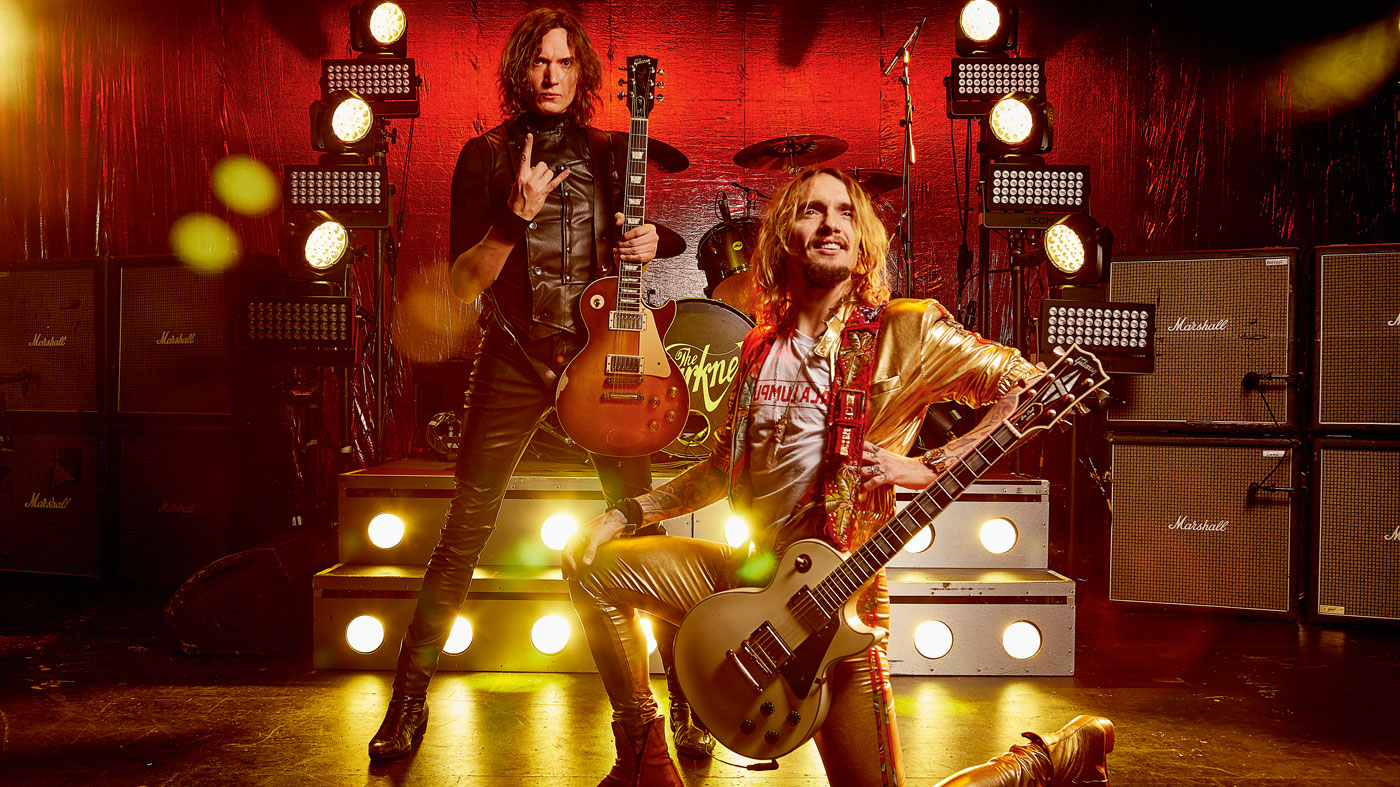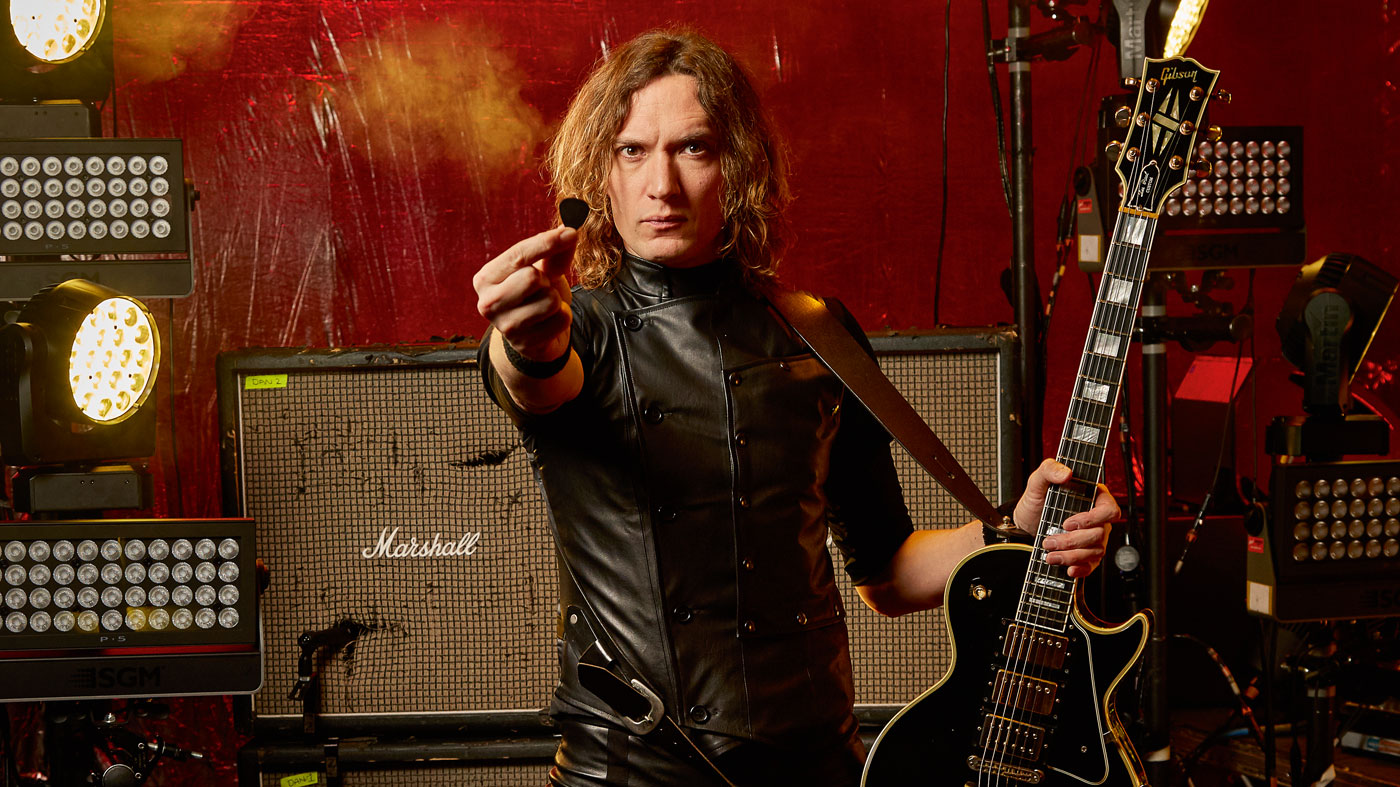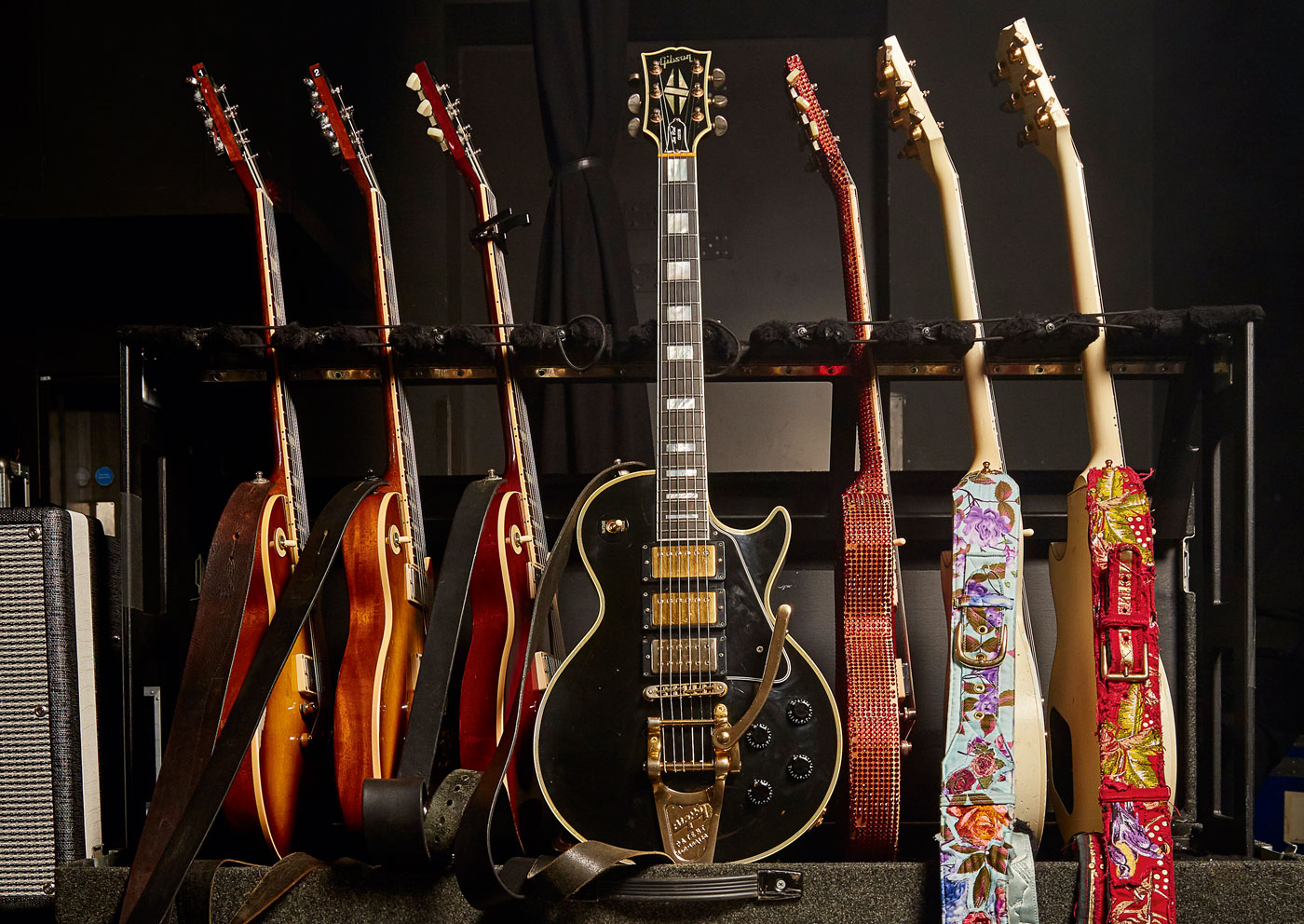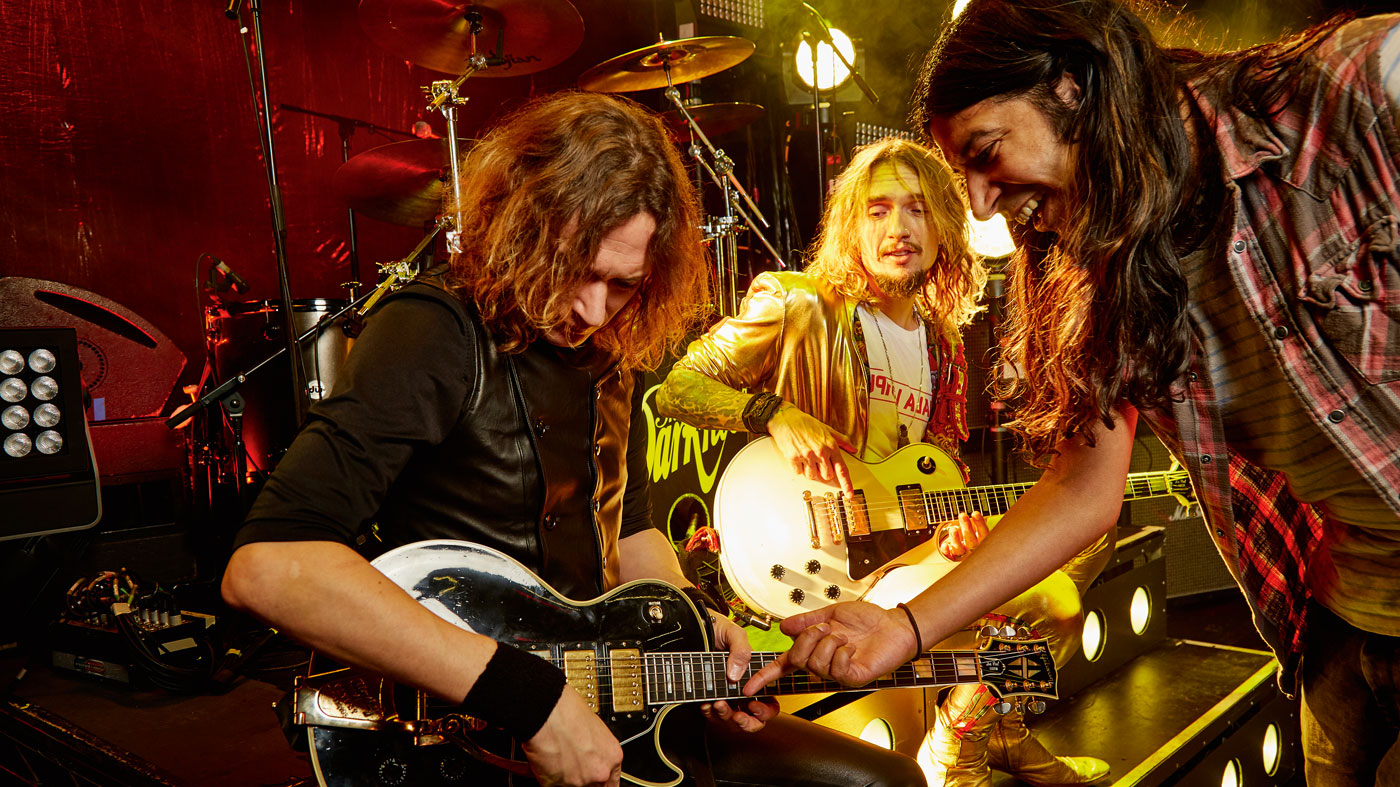The Darkness: “Less can be more… because more is too much sometimes”
Justin and Dan Hawkins on lessons learned in service to rock

Want all the hottest music and gear news, reviews, deals, features and more, direct to your inbox? Sign up here.
You are now subscribed
Your newsletter sign-up was successful
As roadies soundcheck around them at Guildford’s G Live venue, The Darkness frontman Justin Hawkins and brother/ rhythm guitarist Dan are firmly poised for another night of thunderous classic rock.
Dan introduces us to his prized Black Beauty, which was famously owned by Jimmy Page and lives up to its legend as one of the heaviest Les Pauls ever made, while Justin points and grins at the only pedal in front of him - a switch crudely labelled Face Melter. Together, the pair are today’s equivalent of AC/DC’s Young brothers - one of them driving away at the back at the very heart of the band as the other rips across the fretboard at every musical climax. It’s that same chemistry that took the Lowestoft rockers from residencies in pokey Camden bars to headlining Reading Festival 2004 in little over a year.
As with any shooting star, there was bound to be some turbulence along the way, but since reforming in 2011 they’ve proved this band are still more than capable of “shitting out solid gold” - as goes the lead single from this year’s fifth album, Pinewood Smile. Here the brothers Hawkins give their guide to finding nuggets of your own…
Flick of the wrist
The less in between your hands and the amp the better, believes Justin…
“Quite honestly, it’s all in the fingers. I think using a wah makes me lazy as a player. It makes clumsily fretted notes sound more impressively struck than they really are and smudges a run to give the illusion that there’s more happening than there really is. It always annoys me when I hear it used in lead work like that. It’s supposed to add expression, but too many lead players use it to phone in shit solos.
Wah’s supposed to add expression, but too many lead players use it to phone in shit solos
“I’d rather take the time to get it right and was more influenced by guys like Brian May, Angus Young and Eddie Van Halen - as well as a guitarist called Dave Hawkins (no relation) who currently plays with Steve Harris in British Lion. He was a local player who I was massively impressed by as an adolescent man-child in Lowestoft. He made me realise that even if you come from a small town, if you have the talent you can still kick arse.”
Don’t write the same song twice
Dan’s guide to making a record that commands attention throughout…
Want all the hottest music and gear news, reviews, deals, features and more, direct to your inbox? Sign up here.
“It’s the same philosophy on every album - we’ve always tried to make sure not to write the same song twice, at least on the same record. If we have a mid-tempo plod rocker like Solid Gold, we won’t have another one. We’ll come away from there, and same with the fast, thrashier songs like Southern Trains.
“The starting point for all my writing is rhythm. It’s either the beat in my head or a riff telling our drummer Rufus [Taylor] ‘This is where I want to go!’ After a writing session, you’ve covered all the fast ones… so you come up with whatever Why Don’t The Beautiful Cry is [laughs]! If nothing’s really happening, I’ll stick a capo on and start playing. The things you’ll come up with might end up back in standard tuning without the capo, but it will still inspire you to think differently.”

A night at the opera
Justin on the secret to adding great harmonies to your solos…
‘New’ doesn’t need to be inventing a new chord - it can be an attitude
“I’ll usually start off by tracking the third and fifth harmonies. If that doesn’t sound rich enough, try an octave down of root, third and fifth. If that doesn’t sound rich enough, try adding an octave up of root, third and fifth. If that still doesn’t sound rich enough, double everything and hard pan the first lot over to the left and the second lot over to the right. If that doesn’t work, give it up.”
Thunder and lightning
Dan explains why it’s important to have an edge with classic sounds…
“We don’t like to criticise other musicians as a rule, but one thing that always disappoints me is seeing an up-and-coming rock band, and they sound like The Black Crowes. They get stuck on a certain tuning or pattern. It’s more like mimicking than trying to do anything new. ‘New’ doesn’t need to be inventing a new chord - it can be an attitude.
“There’s always this thing about the blues, everyone seems so stuck on it. Sure, it’s great and has its place, but my favourite music isn’t hugely bluesy. People might think Bon Scott was a blues singer, but there is a lot more than that going on. I hate hearing singers trying to be authentic doing that old blues thing. Fuck authentic! I’d rather see a band trying to make me laugh or with a fuck-ton of attitude, otherwise it’s boring.”
Body language
Justin dissects the obstacles that every guitarist faces…
“Co-ordination is an issue for me, as it is for many players. I don’t think I’ve really nailed everything... I’m just doing my job! It takes real effort to improve, and I wish I’d started playing as a toddler, when you can really absorb knowledge and skills. I think the key to it is expression. If you play a note and make it sound emotional, it’s all about the strike, the eventual dampening and the vibrato.
The guitar is your voice. Your left hand is the vocal chords and your right hand is the tongue and lips
“I often think about how a great singer would approach it. The guitar is your voice. Your left hand is the vocal chords and your right hand is the tongue and lips. I tend to wear my guitar a little lower than comfortable just because I like to operate outside of the easy zone. If it hurts to play, I think you can hear the pain sometimes. If it’s pure agony, you’ll also pull all the right faces to express the world of pain you’re in. And we prefer low guitars because that’s where the magic happens. Shoot from the hip? I shoot from below the hip! Dan’s even worse, he shoots from the knee.
“I sometimes play the guitar in my lap, just sat there. I was a big fan of Jeff Healey, who played the guitar in a certain way because he just felt it. Put the guitar in a different position and find out more about it from a different perspective, understanding changes you feel. Plus, whenever you’re having a really great gig, you can turn your guitar upside down and everyone will be like, ‘Fuck me! What is going on there?!’”
For those about to rock
Dan on how the band found its feet around a multi-instrumentalist frontman…
“How it started originally was Justin wasn’t supposed to play any guitar at all. He was just the frontman at the beginning, then he started doing the occasional solo. And I’ve never been comfortable with solos, plus he sounded so good. I’m happy to hold it down at the back. I was a drummer primarily, then I learned to play bass and moved to London as a bassist. I only ended up on guitar because the band I was in before were working with a big producer and the guitarist was taking ages. I still consider it a sideways move rather than a promotion! I only wanted to sit at the back so I was forced into this thing and had severe stage fright right up to a year into The Darkness. It’s only when I realised no one was looking at me, they were looking at Justin, that I got over that stage fright.”

Under pressure
Why Justin is a firm believer of not fitting in…
“Reverential music is a waste of time. If anything, be irreverent and discard the things you love. Because if you truly love them, they will come back even if you try to resist and pursue something completely different. People are too afraid to try something new just in case it undermines their realness.
People are too afraid to try something new just in case it undermines their realness
“If you want to be the next Queen, well… the last Queen was perfectly adequate. Even looking at just the singles, the amount of influences in the band, before you even get to the deeper cuts… there’s flamenco, all sorts of stuff in there. There are albums and albums of great music that is all the Queen we need. If you create something new, you’ll need to be informed about other things.
“Strive for the extraordinary instead of the ordinary, the unreal as opposed to the real, the irreverent over the reverent and shit hot instead of shit! It’s like having a 9-5 and you wear a black tie all day long - so then outside of those hours, you take the tie and turn it into a headband. It’s that principle.”
The winner takes it all
Dan on how listening to pop artists helped shape his ear…
“It’s not just about learning your favourite riffs. If you start understanding how other songs are written, from ABBA to whatever is in the charts, that will be a great exercise in itself. You can play it how you want to, but it’s important to know how stuff works in songs. ABBA were actually a huge influence on me as a musician, there’s probably just as much harmonised guitars in their songs as you’d find in Thin Lizzy. The reason why I loved Thin Lizzy so much at first is because they reminded me of ABBA!
“It’s all about melody and harmony. We could break into any hit song over the last 30 years and give it a good go - me and my brother grew up listening to a broad selection of music and for a very long period of time, we had the same record collection. But if you’re narrow-minded as a listener you might be missing out.”

The song remains the same…
Justin on why the song must always come first…
“Mostly, this all happened for us because we deal in proper melodies. While I might joke around saying it’s all powerchords, Dan’s often got the full chord in there like Malcolm - who was the ultimate full chorder! He was properly adding the thirds in there.
AC/DC might have been using traditional rock’n’roll melodies, but everything was informed by those chords
“AC/DC might have been using traditional rock’n’roll melodies, but everything was informed by those chords. That’s what we’ve always tried to do… the melodic journey needs to be picked up by the guitar. We write proper songs, which helps, though sometimes we try not to, which is also important I think. If it’s just powerchords with blues licks, that doesn’t really count as a song, before you even get into the lyrics. It can be a bit like reciting a monologue.”
High voltage
Dan on the importance of power breaks even at big venues…
“We have 100-watt Marshall amps and need the power breaks. I honestly think those things make a massive difference. We’re at the point in our tone quest where we’ve finally got it nailed on stage. The sound guy can’t cope with 100 watts without an attenuator, you can’t put enough in the PA to work out what it sounds like - because it’s so loud on stage. It causes all sorts of mayhem and then the monitoring becomes so fucking loud.
“My dream is to have a 75-watt amp, because 50 isn’t quite loud enough and 100 is too much. It’s not just volume, there’s an immediacy to how you hit the note, I find 50 will have a bit of a squelch. It’s nice, but with 100 - you hit the strings and it’s there. It’s a no-win situation, you’ve got have it full blast and without a power break for it to sound good, but the front of house guys can’t handle it. That’s been my ongoing problem but I’m through the worst of it.
“At the moment I’m using Marshalls, Les Paul Standards, plus a Diezel VH4 pedal, a Schaffer Replica, some Tubescreamers and other bits. For the next tour, I might get a Vox AC30 modded by the guy who did all of Brian May’s amps. Those things just roar!”

Touch too much
Justin on why it’s best to save your big rockets for the main fireworks…
“Less can be more… because more is too much sometimes. Except for maybe songs like One Way Ticket To Hell (And Back), where we wanted to make a song about a South American product and doing it with some Asian flavours and middle Eastern vibes on a sitar sound. It was some English guys exploring… geographically and emotionally. Christ, there’s panpipes on that as well!
Less can be more… because more is too much sometimes
“But for the most part, I don’t know if we have enough technical wizardry to be able sustain it any longer than the flashes we already give. We’d probably get lost - I say we - I mean me. When Dan gets up to a certain part of the neck, he freezes and I have to talk him down!”
Tower of powerchords
Dan on the main differences between him and his brother…
“I learned to play guitar completely by ear, using chords to work out how songs were written. I listen to the shred guys and feel inadequate. I tend to turn it off and stick with something much simpler. I’ve never been able to find my way out of a solo because I don’t know what I’m doing. Justin knows exactly what he’s doing all the time, he’s thinking about how he’s going to end it, with me it’s just pure aggression. I’m trying to hit it hard and play as fast as I can, just to at least sound like I know what I’m doing. Coming from other instruments, I’ve never thought of myself as a guitarist, let alone a lead guitarist! I don’t know a single fucking scale, other than the one Justin showed me, which I think he called ‘ye humble blues scale’”.
Amit has been writing for titles like Total Guitar, MusicRadar and Guitar World for over a decade and counts Richie Kotzen, Guthrie Govan and Jeff Beck among his primary influences. He's interviewed everyone from Ozzy Osbourne and Lemmy to Slash and Jimmy Page, and once even traded solos with a member of Slayer on a track released internationally. As a session guitarist, he's played alongside members of Judas Priest and Uriah Heep in London ensemble Metalworks, as well as handling lead guitars for legends like Glen Matlock (Sex Pistols, The Faces) and Stu Hamm (Steve Vai, Joe Satriani, G3).


